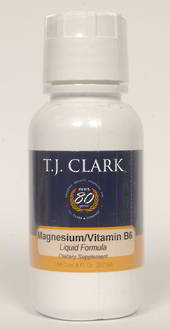
NZ $26.00
|
Magnesium with Vitamin B6
T J Clark’s magnesium/B6 formula is a liquid supplement featuring two highly compatible nutrients for optimal magnesium repletion. Magnesium deficiency is considered epidemic, it can impact on many biochemical processes and be expressed via a diverse range of clinical symptoms and signs. Our formula has been specifically developed to relieve muscular aches and pains, reduce the effects of mild anxiety and nervous tension, increase oxygen uptake capacity and reduce serum lactate levels associated with physical effort. Vitamin B6 enhances magnesium uptake and shares many of the biological pathways with magnesium including female hormonal regulation. Note – this product sheet cannot possibly summarize all of the research associated with magnesium and vitamin B6.
Each 8ml contains
Magnesium (as gluconate)
Pyridoxine (B6) |
300mg
5mg |
Inactive Ingredients:
Purified water, Organic vanilla flavor, Potassium Sorbate (0.1%)
Prevalence of Deficiency
A CSIRO study of Australian adults found the daily intake of magnesium was below the RDA for 50% of all males tested, and for 39% of all females. Despite this, severe magnesium deficiency signs are not common, yet much chronic pathology is responsive to magnesium supplementation. In the United States deficiencies appear to be even more common. Approximately 80 to 85 per cent of the adult females and 50 to 65% of the adult males had intakes below the USA recommended levels. Recommendations for supplemental magnesium may often represent the best strategy for clinicians to help people to correct depleted cellular reserves of this important nutrient.
Pharmacology and Research of Active Ingredients:
- Magnesium may have anti-osteoporotic activity. Magnesium has anti-arrhythmic activity. Magnesium has activity in the management of preeclampsia. Magnesium may have anti-hypertensive, glucose-regulatory and bronchodilatory activities. Magnesium has putative myocardial protective activity during an acute myocardial infarction and putative anti-migraine activity.
- Magnesium depletion is associated with a number of cardiac arrhythmias, including atrial fibrillation, premature atrial and ventricular beats, ventricular tachycardia and ventricular fibrillation. Magnesium is effective in treating these arrhythmias in those who are magnesium deficient. Magnesium may also be effective in treating cardiac arrhythmias in those who are not magnesium deficient. The mechanism of the anti-arrhythmic action of magnesium is not fully understood. The anti-arrhythmic effect of magnesium may be related to its role in maintaining intracellular potassium. It may also be related to its role as a natural calcium channel blocker.
- Any significant stressor has a dramatic effect on body magnesium homeostasis. Stress generates an increase in stress hormone (catecholamine) release, which initiates movement of cellular magnesium into the plasma with associated renal magnesium loss. Catecholamines also induce lipolysis, resulting in increased free fatty acid levels in blood. These fatty acids are able to bind magnesium, resulting in a further reduction in available magnesium and increased renal loss. Complicating the magnesium depleting effect of stress is the exaggerated release of stress hormones during magnesium deficiency. Thus, a vicious cycle can develop where stress increases cellular magnesium loss causing renal magnesium wastage, resulting in an exaggerated stress response.
- Magnesium modulates neuronal excitability and decreases membrane fluidity by binding phospholipids and modulates calcium release, thus essential for anxiety and nervous tension. These effects are thought to be responsible for the psychological effects of magnesium deficiency: loss of concentration, disorientation, abstract thinking and memory loss. Magnesium levels were studied in a population of psychiatric in-patients who were admitted with a range of conditions including schizophrenia, mania with depression and neurosis. All patients showed substantially lower magnesium levels than normal. The deviation of magnesium levels from the mean also correlated significantly with severity of symptoms. Supplementation with magnesium is expected to improve the status of psychiatric patients.
- Many conditions in clinical neurology may be responsive to pyridoxine as a therapeutic agent. Headache, chronic pain, and depression have been observed to have serotonin deficiency as a common thread, and pyridoxine has been shown to increase serotonin. B6 has a significant beneficial effect on emotional type PMT symptoms (depression, tiredness, irritability). B6 participates in the conversion of tryptophan to niacin and is required for the synthesis of a variety of neurotransmitters, including GABA, norepinephrine, acetylcholine and histamine.
Clinical Applications:
T J Clark’s Magnesium/B6 formula may be beneficial in the prevention and treatment of:
- Adrenal stress, arrhythmia, asthma, ADD and ADHD, candidiasis, coronary artery disease, circulation, convulsion, congestive heart failure, cramps and diabetes.
- Depression, dysmenorrhea, eclampsia, epilepsy, fibromyagia, headaches/migraines, hyperglycaemia, hypertension, hypoglycaemia, insulin resistance and muscle soreness.
- Parkinson’s disease, pregnancy and lactation, PMT symptoms, fluid retention, restless leg syndrome and increased athletic fitness.
Contents: 237ml
Storage: Store below 30 C
Dosage and Administration: 8ml once or twice daily.
|